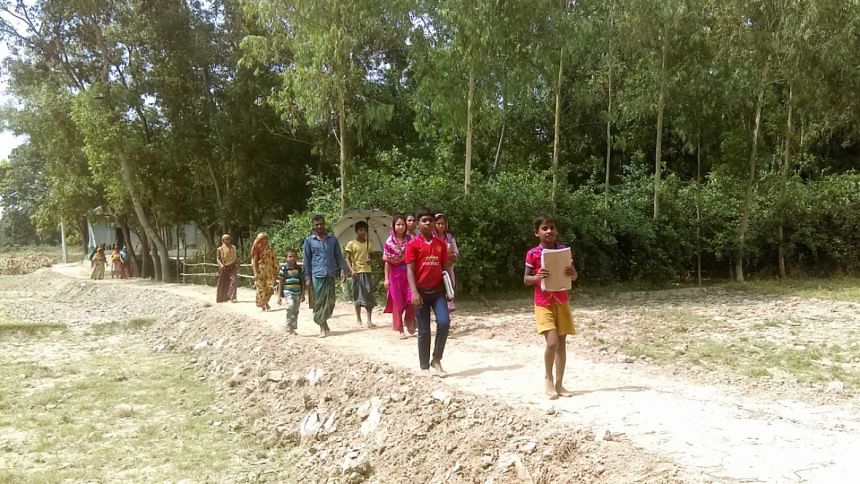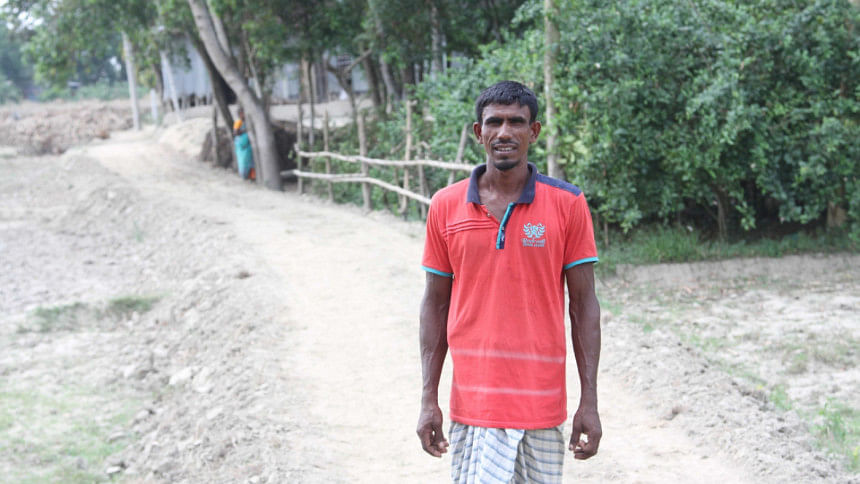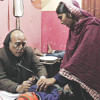Change maker: Farmer lays a road for his village

It all began with a simple thought -- the villagers need a road to go to the nearest market, but there is none. Nor did the local administration take any initiative. So Mohammad Chhainuddin, a farmer, took it upon himself to build one.
Chakgagadhar is one of the most underprivileged villages in Tangail’s Nagarpur upazila and was virtually cut off from the mainland due to the absence of a road link.
The villagers would use a 1.5km narrow ridge (or ail, which separates two plots of land) from the edge of Chhainuddin’s house to a concrete road to go to the local market for trading. It was also the only passage for their children to school.
But during monsoon that passage would go under waist-deep water causing immense sufferings. With no easy alternative route, the villagers had to take a boat or wade through water to go about their business.
“Sometimes, I had to take my daughter on my shoulder to get her to school,” Chhainuddin recalled.
The village had been overlooked for years in the absence of educated and powerful people who could influence the local administration, he said. It would take only a few months for Dhuburi Union Parishad to build the road, he added.
“Seeing no ray of hope from anywhere, I had been thinking for the last seven-eight years to construct the road by myself and finally started the work four years ago, taking earth from my own land,” said the 45-year-old farmer.
“After a few weeks, I got the support of my younger brothers who joined me in the effort. I also hired day labourers for some time.”
However, it was not easy to build a road single-handedly. It took Chhainuddin sheer willpower, hard labour, and four years of perseverance.
With no financial muscle, he relied on a pair of hands to turn the low-laying narrow ridge (ail) into a five feet wide and three feet high road.

Chhainuddin’s younger brother Abdul Ghani, who studies at Dhaka University of Engineering and Technology (Duet) in Gazipur, was one of those who gave a hand in the extraordinary effort whenever he was at home during vacation.
But a modest Chhainuddin credited the villagers, too, for helping him all the way. “It could not have been possible for me to build the road alone, had the villagers not agreed to give their land and earth for it,” said a smiling Chhainuddin.
He even refused to consider that he had done something heroic.
“I have not constructed the road only for the villagers, my family members are also enjoying the benefits,” he told The Daily Star.
But the villagers publicly acknowledged that it was his determination and hard work that made it possible.
“Chhainuddin Bhai has got a big heart. He has not only given hard labour for a few years but also sacrificed his land. Besides, he lifted a huge amount of earth from his pond for earth-filling,” said villager Abu Sayeed.
Now, besides the villagers, light vehicles like rickshaw-vans with goods can easily move on the road, he added.
The road opened in early May and facilitates movement of 1,500 villagers.
Chhainuddin’s wife Lucky Begum said her husband did the earth-filling till midnight many a days after completing work at his farm. He never complained, she said. “He did it with complete devotion and also in a joyous mood.”
Chhainuddin’s daughter Sonia Akter, 19, is proud of what his father has done. “My father has not received any institutional education. But he is more advanced in thinking than many educated people. I’m proud of him.”
Sonia is the eldest of Chhainuddin’s three children. She studies in class XI at a local college.
The gargantuan effort of the farmer has understandably served as a wake-up call for the local authority, and Motiar Rahman, chairman of the union, admitted that they were embarrassed for not doing what Chhainuddin did.
Motiar said they supported the earth-filling work of the road by providing labourers under the government’s 40-day work programme.
Chhainuddin, however, sought urgent government support to make the road another four-foot higher at several places before monsoon hits. “Otherwise, the newly-built clay road may get washed away at different points if submerged by water,” he feared.
Contacted, Nagarpur upazila nirbahi officer Syed Fayezul Islam said he would take necessary measures in this regard if he receives an application from the farmer or other villagers.

 For all latest news, follow The Daily Star's Google News channel.
For all latest news, follow The Daily Star's Google News channel. 








Comments